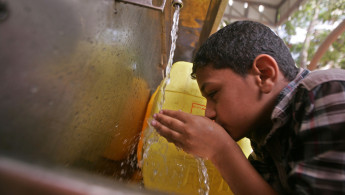Israel 'to increase water supply' to Gaza
The construction of a new water reservoir was finished a few days ago, Israel's Coordination and Liaison Administration for Gaza said in a statement, which will provide drinking water to 200,000 residents of the Palestinian territory.
"We welcome the completion of construction as part of the efforts to improve the lives of residents in the Gaza Strip," the CLA said.
The new reservoir will be connected to a water pipeline in the Nahal Oz kibbutz in southern Israel, along the border with Gaza.
The reservoir can retain around 5,000 cubic metres of water, which is set to lead to an annual increased transfer of between 1.5 to three million cubic metres of water to Gaza.
Currently Israel provides five million cubic metres a year.
CLA added in its statement that it was continuing efforts "to help carry out the reconstruction process in Gaza and to coordinate hundreds of international projects to develop and reconstruct the Gaza Strip".
Since the 2014 war, Gaza has had little chance to recover – 95 percent of drinking water available from coastal aquifers became unsafe to drink, and 72 percent of households relied on UN-supplied rations in May 2015, according to a UN report which said the enclave could be uninhabitable by 2020.
Earlier this month, the UN's top humanitarian chief Stephen O'Brien said Israel had tightened its decade-long siege of the Strip, where 70 percent of its two million population has running water for only a few hours every two to four days – most of which is not drinkable.
Israel also unilaterally adds high interest rates and deducts non-payment from the Palestinian Authority tax revenues for delays or inability to pay for sewage services, water and electricity that the territories import from Israeli facilities.





 Follow the Middle East's top stories in English at The New Arab on Google News
Follow the Middle East's top stories in English at The New Arab on Google News
![Israeli forces ordered bombed Gaza's Jabalia, ordering residents to leave [Getty]](/sites/default/files/styles/image_330x185/public/2176418030.jpeg?h=a5f2f23a&itok=_YGZaP1z)

